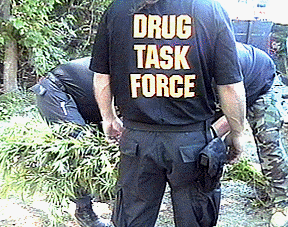Feature:
As
the
Well
Runs
Dry,
Texas
Drug
Task
Forces
Ride
Off
Into
the
Sunset
4/7/06
The 18-year ride of the Texas drug task forces is at an end. The task forces, composed of police from multiple agencies working together to wage the drug war, have run out of credibility after tens of thousands of arrests, mostly of small-time offenders, and endless scandals -- most notably, but by no means only, the Tulia affair. Now they are out of money, too. In a little noticed move, late last year Texas Gov. Rick Perry (R) shifted the focus of state-controlled federal Justice Assistance Grants from the task forces to other areas, most notably to a program called Operation Linebacker, which will concentrate on stopping the drug traffic along the Mexican border.
That was only the final blow to the increasingly beleaguered task forces. At their peak, Texas boasted 51 of the regional task forces, employing some 700 officers to wage full-time war on drug users and the drug traffic. But after Gov. Perry took control of the federal grant purse strings and centralized the disbursal of task force funds in the state Department of Public Safety in 2002, making task force commanders answer to Austin if they wanted the money, their numbers began to decline. By this spring, they were down to 22, and since then, commanders have been announcing the dissolution of task forces on what seems like a weekly basis. Only one, based in Wichita Falls, has publicly announced plans to continue. "This should send a loud message to police and the public that we do have the ability to rein in law enforcement and hold police accountable and create significant reforms," said Will Harrell, executive director of the American Civil Liberties Union of Texas, an organization that played a key role in the years-long battle to rein in the task forces. "In the beginning of this struggle, nobody thought we could do it, but we have, and this is just one example of the power we can wield." "This represents the culmination of years of work and activism by more than a dozen groups and hundreds of people across Texas in response to the Tulia and Hearne debacles," said Scott Henson, director of the Texas ACLU's Police Accountability Project and author of the Texas criminal justice blog "Grits for Breakfast." "It is a victory for people who oppose abusive police practices and think the drug war is out of control," he told DRCNet.
Building on the dismay and disgust around Tulia, the Texas ACLU announced it had discovered "another Tulia" in Hearne, Texas, where a task force informant admitted lying in a case where the local task force had arrested 28 black men. In 2001, thanks to prodding from the Texas ACLU, the legislature passed a bill required civilian informants to have corroborating evidence in drug stings. The measure would not have prevented Tulia, but it would have prevented Hearne. "In most places, these issues emerge around race, and that was certainly part of it in Texas, but the issues of police misconduct and bad police practices have been more central here in Texas," said Henson. "This really picked up steam after Tulia, when even the Texas legislature began viewing those tactics as indefensible." In fact, the Texas House voted four different times since then to get rid of the task forces, but the Senate would not go along. It did go along with last year's bill that said the task forces had to comply with Department of Public Safety rules or lose their funding. "Most of them chose to shut down at that point rather than comply," said Henson. The end of the task forces does not mean Texas local law enforcement is going to ignore drug law violations. While the 700 task force members are gone from the task forces -- some laid off, some doing other police work, and some continuing to do drug law enforcement in single agency narcotics divisions -- the drug laws remain on the books. But where the task forces would do things like arrest crack smokers to drive up their numbers to ensure more funding next year, Gov. Perry's redirection of the federal funds means less emphasis on drug users and more emphasis on distribution rings. "What this really represents is a shift in focus toward large trafficking organizations and away from low-level users and addicts," said Henson. "When you shift the money to the border, it's to go after the cartels, while the task forces would go after those low-level people. They would do things like send a confidential informant out to smoke crack with some other people, and when they would run out, he would pull out a $100 bill and say 'Let's get some more,' and when a friend takes it and brings back some rocks, he would get arrested as a drug dealer. That boosted their numbers and sent lots of people to prison, but did little to actually stop the drug trade." "The end of the task forces puts 700 narcotics agents out of business. This will unquestionably have an impact on the ground," said Harrell. "Those task forces were responsible for thousands of arrests each year, 14,000 people last year alone."
|


